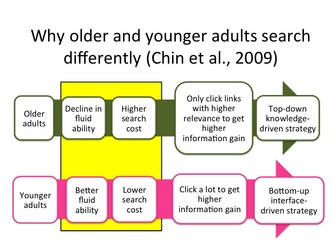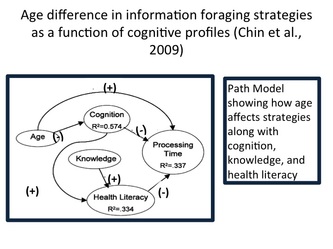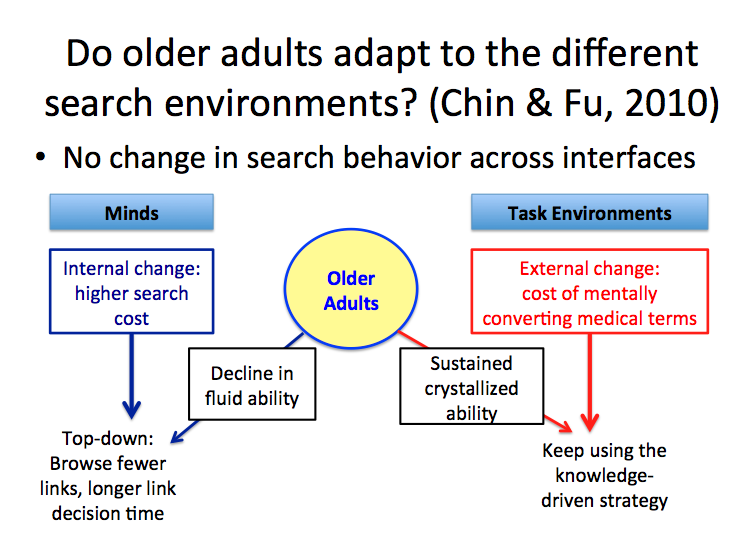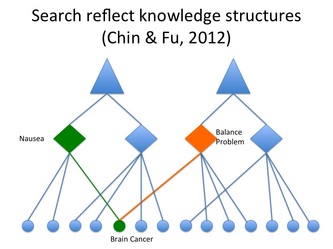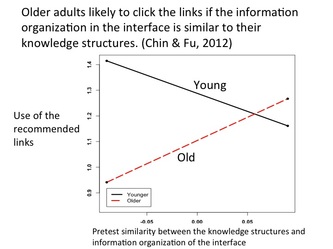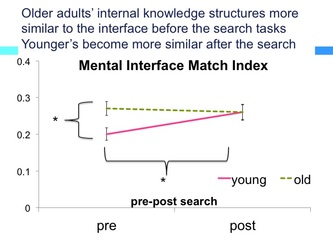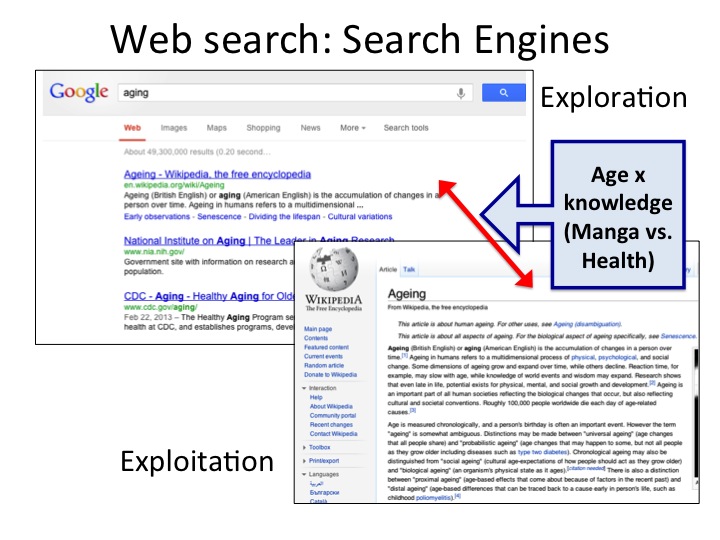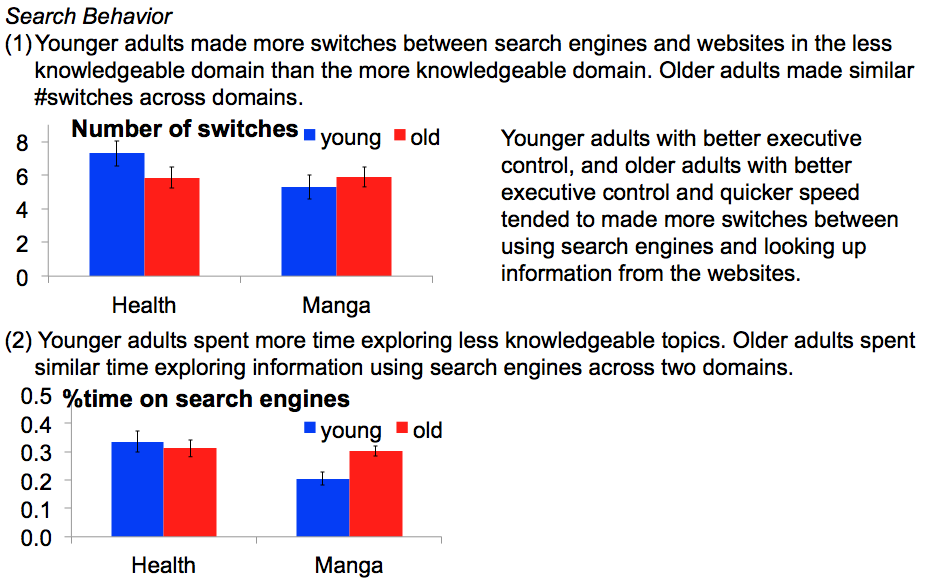Under the supervision of Professor Wai-Tat Fu from the Department of Computer Science, I've conducted a series of studies to uncover the interplay among age-related changes in cognitive abilities of information seekers, structures of web information, and different kinds of search tasks. Furthermore, based on previous understandings of age-dependent adoption of search strategies, we also developed interventions to promote search among older users. The studies were conducted using our controlled websites, with manipulations on the information organizations using latent semantic analysis.
I. Adaptive Information Search among Younger and Older Web Users
Previous research has shown that older adults performed worse in web search tasks, and attributed poorer performance to a decline in their cognitive abilities. We conducted a study involving younger and older adults to compare their web search behavior and performance in ill-defined and well-defined information tasks using a health information website. In ill-defined tasks, only a general description about information needs was given, while in well-defined tasks, information needs as well as the specific target information were given. We found that older adults performed worse than younger adults in well-defined tasks, but the reverse was true in ill-defined tasks. Older adults compensated for their lower cognitive abilities by adopting a top-down knowledge-driven strategy to achieve the same level of performance in the ill-defined tasks. Indeed, path models showed that cognitive abilities, health literacy, and knowledge influenced search strategies adopted by older and younger adults. Design implications are also discussed.
Publication:
Chin, J., Fu, W-T. & Kannampallil, T. (2009). Adaptive information search: Age-dependent interactions between cognitive profiles and strategies. Proceedings of the 27th ACM Conference on Human Factors in Computing Systems CHI’09 (pp.1683-1692). Boston, MA: ACM Press.
Publication:
Chin, J., Fu, W-T. & Kannampallil, T. (2009). Adaptive information search: Age-dependent interactions between cognitive profiles and strategies. Proceedings of the 27th ACM Conference on Human Factors in Computing Systems CHI’09 (pp.1683-1692). Boston, MA: ACM Press.
II. Interactive Effects of User Interface and Cognitive Profiles on Web Information Search
|
We present results from an experiment that studied the information search behavior of younger and older adults in a medical decision-making task. To study how different combination of tasks and interfaces influenced search strategies and decision-making outcomes, we varied information structures of two interfaces and presented different task descriptions to participants. We found that younger adults tended to use different search strategies in different combination of tasks and interfaces, and older adults tended to use the same top-down strategies across conditions. We concluded that older adults were able to perform mental transformation of medical terms more effectively than younger adults. Thus older adults did not require changing strategies to maintain the same level of performance.
Publication: Chin, J., Fu, W-T. (2010). Interactive effects of age and interface differences on search strategies and performance. Proceedings of the 28th ACM conference on Human Factors in Computing Systems CHI’10 (pp.403-412). Atlanta, GA: ACM Press. |
III. Age Differences in the Differential Use of Recommended Links
The study was conducted to investigate how older and younger users learned by performing exploratory search of health information using an interface that recommended relevant links based on browsing histories. While older and younger users gained both factual and structural knowledge about the health topics, significant age differences were observed. Our results showed that processing of recommended and regular Web links imposed distinct demands on cognitive abilities, which at least partially explained the observed age differences in the search process. The use of recommended links was positively associated with general knowledge, while the use of regular Web links was positively associated with processing capacity. Results also showed that the recommended links benefited both younger and older adults by broadening the exploration of information, which led to better learning. Implications on designs of health information interfaces that facilitate exploratory search and learning for different age groups were discussed.
Publication:
Chin, J., & Fu, W-T. (2012). Age differences in exploratory learning from a health information website. Proceedings of the 30th ACM conference on Human Factors in Computing Systems CHI’12 (pp. 3031-3040). Austin, TX: ACM Press.
Publication:
Chin, J., & Fu, W-T. (2012). Age differences in exploratory learning from a health information website. Proceedings of the 30th ACM conference on Human Factors in Computing Systems CHI’12 (pp. 3031-3040). Austin, TX: ACM Press.
IV. Web Information Exploration and Exploitation using the Search Box
|
We regarded the use of search engine, including generating keywords on a search engine and looking up the information returned from the search engine, as an action to regulate exploration and exploitation. The study examined how younger and older adults interact with search engines in the topics that they were more or less knowledgeable.
The preliminary study is funded by Chateaubriand Fellowship (Humanities & Social Science) with collaboration with Professor Aline Chevalier in University of Toulouse. Publication: Chin, J., Anderson, E., Chin, C-L. & Fu, W-T. (2015). Age differences in information search: An exploration-exploitation tradeoff model. Proceedings of the 59th Annual Meeting of the Human Factors and Ergonomics Society 2015. Los Angeles, CA: Human Factors and Ergonomics Society. Chin, J., Chevalier, A., He., J. & Fu, W-T. (2014). Linking knowledge in the head to knowledge in the world: Age differences in web exploration with the search engine. Poster of the Cognitive Aging Conference 2014, Atlanta, GA. |

